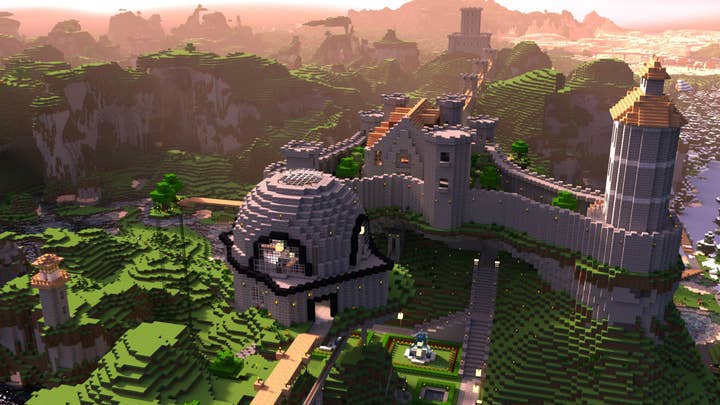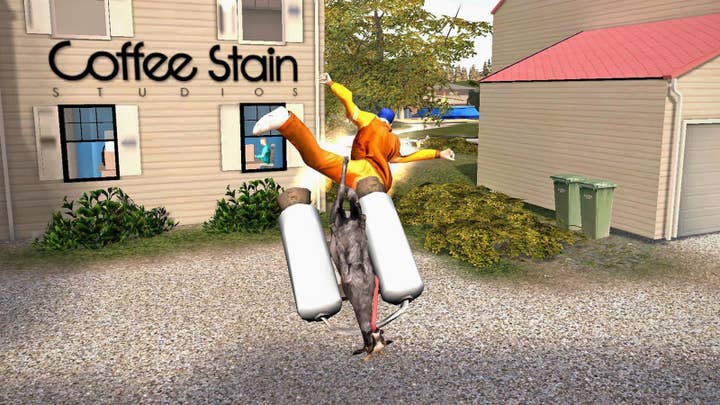Daniel Kaplan leaves Mojang for Coffee Stain
Mojang's first employee on his "emotional" decision to leave, and leading Coffee Stain's charge into the world of indie publishing
Minecraft is now so popular and far-reaching it can feel like it's been around forever, but its rise to ubiquity played out in considerably less than a decade.
Daniel Kaplan was there for almost every day of that remarkable journey. He was the first Mojang employee hired by Markus "Notch" Persson in 2010, a year after the company was founded and just a few months after the launch of Minecraft's alpha version. What happened since is one of the great success stories in the history of this industry, and as business developer, producer and production director Kaplan has played an essential role in getting Minecraft to where it is today.
However, just as Persson decided to step away from the company in 2014, Mojang's employee #1 has also decided it's time to move on.
"It's still Minecraft, we're still doing cool stuff with Minecraft, but I wanted to explore other ideas as well"
"It's very emotional," Kaplan says, speaking exclusively to GamesIndustry.biz. "It was hard to come to this conclusion. Minecraft has been great. It's still Minecraft, we're still doing cool stuff with Minecraft, but I wanted to explore other ideas as well."
This is all perfectly natural, of course. People involved with companies from their earliest days often leave when the hard work that goes into establishing its reputation has been done, and Minecraft's reputation is, at this point, virtually beyond reproach. The question, then, is not so much why Kaplan would leave Mojang, but why he would leave now.
Persson stepped away from the company shortly after Microsoft acquired it for $2.5 billion, but Kaplan admits he was curious about being part of such a large structure. "I wanted to stay and explore how it is to work in a bigger environment, because I've always worked in smaller companies," he says. "It has been a learning experience for me.
"But I always told myself I would evaluate every year how I feel about the company's situation, to see if the work still helps me to grow in various ways."

In part, Kaplan says, the decision to leave was all about timing. Coffee Stain Studios, the Swedish company best known for the Goat Simulator series, approached Kaplan about working for its new publishing arm six months ago - an offer he declined. A few months later, Kaplan welcomed his first child into the world; the kind of event that signals great change in anyone's personal life, and one that has precipitated this moment of change in Kaplan's career.
"There was a lot of different things happening at the same time, so I thought, 'well, maybe I should just make the move now, see what happens'."
One thing that is unlikely to change is Minecraft. With Kaplan's departure, another strand of connective tissue between Mojang's past and its present falls away, but Minecraft is long past the point where any one individual could be seen as essential to its future.
"The idea was always to try and keep it small, but Minecraft was growing and growing and swallowing all of the resources internally"
"I don't think any of us who were early [working at Mojang] could have anticipated what it would become, and what it can potentially be," he says, pointing to Mojang's collaboration with the United Nations, Block by Block, as a favourite example of the surprising ways Minecraft has grown. "There's still so many amazing projects using Minecraft in the world."
Then there's the various ways Microsoft is pushing Minecraft as a tool for education, the incoming update that will pull its block-based world into the 4K era, and a grand idea to unify its console, PC and mobile communities. When Mojang was acquired the studio had 35 employees; today, its Stockholm and Redmond offices have a combined workforce of 200, and Minecraft takes up the time of every single one.
"When I started it was just me and Notch," Kaplan says. "The idea was always to try and keep it small, but Minecraft was growing and growing and swallowing all of the resources internally.
"In the end everyone is just working on Minecraft, which in a sense is the right thing to do, but for me it's a bit sad. Because when I joined Mojang, when I was interviewed by Notch, the idea was to create an indie powerhouse that would attract game developers similar to him; who could make a game from start to finish by themselves."

As they discussed that idea, they thought about The Factory, a studio set up by Andy Warhol in the mid-Sixties, which became a hub and focal point for artists and creatives in New York City. "Just have a lot of cool people hanging around, making stuff they love," Kaplan adds, still audibly excited at the concept. "That was one inspiration we had initially, but then it was just more and more Minecraft."
Kaplan is returning to those independent roots with Coffee Stain Publishing, and the chance to work with a variety of different developers on a variety of different projects. It is still early days for the publishing division, with a team of just five people and virtually a blank page in terms of strategy. However, speaking to Kaplan, it's clear that the feeling of starting from scratch is a huge part of the appeal.
"We're keen to help developers to make better games, and not just wait for them to finish it and then push the marketing button"
"It's still very new, so we don't have any set goals or focus yet, but it's all about finding really cool games that we'd like to play ourselves, and sponsor and be partners to those teams," he says. "And we really want to be involved with the projects creatively. I've seen other indie game publishers say that the developers are the creative people, and they just want to watch while the developer makes the best game they can.
"But I think it's not the right approach considering the experience we have making games for many, many years. We want to share that information and knowledge with the studios. We're keen to help developers to make better games, and not just wait for them to finish it and then push the marketing button."
In certain cases, that close working relationship could lead to investments of the kind that Coffee Stain made in Ghost Ship Games and Lavapotion, both of which arose as a natural consequence of a positive working relationship. "That's something we'd like to explore more: investing in the studio, and becoming a tighter partner [rather] than just releasing the game," he says. "We'll see how many investments Coffee Stain will do eventually, but I think it's a really cool way of doing it."
The days when indie publishing was a blue ocean are long since over: Devolver, Tinybuild, Raw Fury, Versus Evil and Annapurna Interactive are just a few companies on a list that grows longer with each passing month. However, while indie developers have more choice in publishing partners than ever before, Kaplan thinks it could be a mistake to concentrate too much on the competition. The indie scene is both expansive and diverse, and those qualities should be reflected in Coffee Stain's strategy
"Do we need our own niche? I'm not sure," he says. "Every team and every project is very different. We're not looking at a certain platform only. We're not only looking at certain kinds of products. It will depend on the people and the game, and we will approach that in the best possible way."
